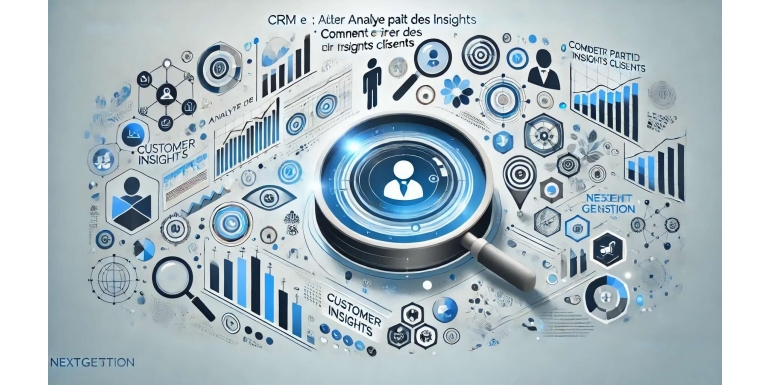
Introduction
In the digital age, businesses have access to an overwhelming amount of data about their customers. When properly analyzed, this data can provide valuable insights to improve business strategies, refine marketing campaigns, and strengthen customer loyalty. However, without the right tools, this data often goes underutilized. This is where Customer Relationship Management (CRM) comes in. By combining a powerful CRM like Dolibarr with data analytics capabilities, businesses can turn information into actionable insights. This article explores how to leverage customer insights through CRM and data analytics.
1. Centralize Customer Data for a Complete View
The first step in leveraging customer insights is to centralize all relevant data into a single system. A CRM like Dolibarr allows you to consolidate information from various sources: purchase history, customer service interactions, marketing campaigns, and more. This centralization provides a comprehensive view of each customer, making it easier to analyze behaviors and preferences. With all data in one place, businesses can identify trends and patterns that would otherwise go unnoticed.
2. Segment Customers for Targeted Actions
Once the data is centralized, the CRM enables customer segmentation based on specific criteria. Segmentation is crucial for personalizing marketing actions and improving campaign effectiveness. With Dolibarr, you can create segments based on variables such as purchase frequency, customer value, or interactions with support. For example, you can target loyal customers with exclusive offers or re-engage those who haven’t made a purchase in a while. This targeted approach optimizes resources and increases return on investment.
3. Analyze Data to Make Informed Decisions
Data analysis is at the heart of transforming information into actionable insights. A CRM like Dolibarr integrates reporting and analysis tools that allow you to examine sales performance, conversion rates, and customer feedback. Through these analyses, businesses can identify what works and what needs improvement. For instance, if an analysis shows that a specific marketing campaign generates a high conversion rate, you can allocate more resources to that campaign to maximize results.
4. Predict Customer Behavior to Anticipate Needs
One of the strengths of data analysis is its ability to predict future behavior. By using historical data stored in Dolibarr, you can anticipate customer needs and tailor your offerings accordingly. For example, if a customer regularly purchases a certain product at regular intervals, you can offer them a special deal before their next expected order. This anticipation not only enhances customer satisfaction but also increases the likelihood of long-term loyalty.
5. Optimize Marketing Strategies with Insights
Insights from data analysis can significantly improve marketing strategies. A CRM like Dolibarr allows you to test different approaches and measure their impact in real-time. For example, you can compare the effectiveness of different email campaigns in terms of open and click-through rates, and adjust your strategy accordingly. This ability to continuously optimize marketing actions enhances customer engagement and maximizes business results.
6. Improve Customer Relations with Personalized Communication
Personalization has become essential in customer relationship management. With insights obtained through data analysis in Dolibarr, you can personalize every interaction with your customers. Whether it’s sending a birthday message, offering a complementary product, or simply thanking a customer for their loyalty, this personalization strengthens the relationship and creates a positive customer experience. Customers feel understood and valued, which contributes to their loyalty.
7. Monitor KPIs for Continuous Performance Tracking
To maximize the effectiveness of a CRM and data analysis, it’s essential to continuously monitor key performance indicators (KPIs). Dolibarr allows you to set up customizable dashboards where you can track KPIs such as customer retention rate, sales cycle, and customer satisfaction. By monitoring these indicators, you can quickly detect anomalies or opportunities and adjust your strategy in real-time. This proactive approach allows you to stay agile and respond to market changes.
Conclusion
Integrating a CRM like Dolibarr with data analytics capabilities offers businesses a unique opportunity to turn raw information into strategic actions. By centralizing data, segmenting customers, analyzing behaviors, and optimizing strategies, businesses can significantly improve customer relations and overall performance. Leveraging customer insights is no longer optional but a necessity to remain competitive in a constantly evolving market.
